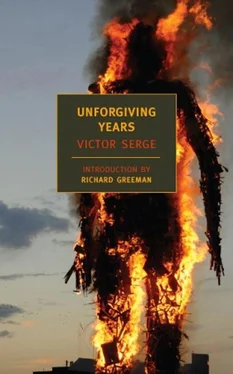“I don’t care,” D answers himself. “He’s a good sort, that boy. Perhaps he’ll understand too, when it’s too late. More likely he’ll be devoured a long time before. He’s the kind who believe with their eyes closed, obey, then take the rap and languish for years in the exercise yards of penitentiaries. After that the Service is in a bind about what to do with them, pay them, earn their silence, or eliminate them… In the future they won’t be dispatched to Mexico or Argentina, but to the great beyond. Much safer. Alain, just for having known me…
But let’s put this at a distance. I didn’t want this farewell. Alain is an enemy now. When he gets over the shock, he’ll be sorry he didn’t act sympathetic — who knows? — his old respectful understanding, just to keep contact. I would have believed in his youth, his concern. He would have led me into a trap. Rule: Trust nobody this side of heaven. Since those who were deserving of all our faith are dead. Defiled and dead. And when all is said and done, we did this to ourselves.
D cast a despairing glance over the place de l’Europe. The rain was falling softly.
* * *
This was no weather for visiting the Bois, but he had time to kill before his painful three o’clock rendezvous. He wasn’t hungry. There must be some direct link between physiology and psychology. But he was thirsty for the sight of trees, water, solitary places; the ideal would be a great sweep of young green saplings and faroff mountains, crisscrossed by birds in flight, scoured by monotonous winds, warmed by a tepid sun, one of those Siberian landscapes that lends a fresh alacrity to sadness (provided you’re not in captivity). And you know that a few hours’ trek would bring you to the banks of the Irtysh, sluggish river, vision of a vast, purposeless destiny… “To the Bois de Boulogne, driver, and there’s no rush.”
The ancient taxicab listed to the left. D found himself rocking along inside a grimy, leather-lined compartment. He rolled down both windows so as to breathe in the rain… The Bois was gingery gray, ash-mauve in its feathery depths, strewn with dead leaves. A spectacle of decline, perfect for today. The tar paths, the clearings between the groves of trees, the smooth surface of the lakes like a blend of sky and mud rolled past in a stately neglect that was neither truly alive nor truly lifeless. “Slower, please, driver…”
D rested. A future resembling these paths. Wanting nothing, expecting nothing, fearing nothing. Belonging to nothing, not even to oneself. No longer holding fast to anything. No longer to be that thinking molecule within a formidable, relentless, clear-sighted collectivity, held taut by so much willpower that it no longer knew what it was doing. Am I that discouraged? I’m turning into a character out of a novel for intellectuals… Everything is falling away from me, everything: the commanding ideas, the Party, the State, the new world under construction, the hard struggles of men and women caught (much as in this chilly wood) like soldiers on the front lines under fire, taking shelter in the trenches, stubborn and exhausted, at war despite themselves for the sake of hope. And the hope betrayed! The streets of the one true capital of the world churning beneath scaffoldings and gridded blocks of broad glass panes, each cell of the concrete hive housing undernourished beings imprisoned by a prodigious destiny (and forty percent parasitic paper-shuffling). Capital of torture! The microphotography labs, the special training schools, the dungeons of the secret prison vibrating with the subway trains, the cryptography departments, the central Power. The place of execution, a solidly reinforced cellar no doubt, thoroughly hosed down, rationalized, into which so many men have descended, suddenly realizing the annihilation of everything: faith, reason, life’s work, life… The red flags… The red flags, the first raw shoots of socialist humanism that no amount of dust, filth, and blood could besmirch entirely… The charm of Western cities, so resistant to analysis, the sensation of a heedless world that knows nothing of hunger, terror, overwork, or the icy, ascetic exhilaration that alone lends meaning to the everyday round; the benign live-and-let-live attitude of that meanly commonsensical, pleasantly hedonistic world, sliding day by day toward apocalypse… The bitter joy of hand-to-hand combat with catastrophes ready to spring out of invisibility into tomorrow’s headlines, that gigantic intrigue snaring countries — pastel-colored on childhood maps — in its net of information and disinformation, ignoble acts and heroic achievements, statistics, petroleum, metals, messages… The conviction that we remain — however wretched — the most farsighted, the most humane beneath our armor of scientific inhumanity, and for that reason the most endangered, the most trusting in the future of the world — and unhinged by suspicion! Ah! With all of that falling away from me, what will be left for me, what will be left of me? This nearly old man, so wisely rational, being rattled along by an ailing taxi through a pointless landscape… Wouldn’t he be better off going home? “Shoot me, comrades, as you shot the rest!” At least such an end would follow the logic of History (since we have offered our lives to History… Carrying out our task to the end. If the sun must be extinguished, then we will extinguish it! “Necessity,” magic formula…). That would be easy; but what about complicity? What if there were no necessity? What if the great machine were running off the rails, what if its mental cogs were perverted, its social cogs corrupted? How did the Old Man put it — “Our hands have lost control, we have lost control of ourselves…” Here thought begins to founder, History being perhaps rather harder to penetrate than we’d imagined, with our three dozen trusty materialist axioms. They will probably kill me quickly. There are three good reasons for them to do so: 1. I am full of corrosive ideas (a Japanese cop would say “dangerous ideas”). 2. They are continuing the work. 3. I’m finished… But what work are they continuing, plunging headlong into what abyss?
His days, his nights turned over disjointedly in his mind. He thought of the faces of the persecuted — studied on photographs, for they were under constant surveillance, zealous spies were planted among them, their little apartments were entered unseen, the papers in their drawers rifled, their letters photographed — and they never suspected, they soldiered on at their microscopic activities, mimeographing newsletters, scraping together the contributions for a leaflet, expounding theories — sometimes correct ones — before an audience of thirty people (including three secret agents) upstairs at the Café Voltaire… Should I join them? Would they believe in me, when I don’t believe in them? I can believe in nothing now but power. Truth, stripped of its metaphysical poetry, exists only in the brain. Destroy a few brains, quickly done! Then, goodbye truth. Power is against them, against me, there’s nothing we can do about it. The torrent is washing us away.
D had been expecting to feel, if not the deep joy of deliverance, then at least the relief at the end of a migraine headache. Contrary to all prudence, he talked to himself aloud: “But I’m right, dammit!” The taxi driver half turned: “What was that, sir?”
“Nothing. Keep going. I’m ahead of schedule.”
Ahead of nothing. Only negation remains. No, no, no, and no. No to power. I, a nonentity, refuse my consent. I preserve my reason when you are losing yours. I assert that the destruction of the finest is the ultimate crime, the ultimate folly. If power turns against itself and starts savagely destroying itself, then I am right to be against it. But it will survive and I will perish, therefore it is right to be against me… Can it survive if it devours itself, if it suffers from so unprecedented an alienation? And surviving this, what if power betrays itself, changes its face and its aims? Then I am the faithful one by betraying it, but that is pure idealism, not practical sense.
Читать дальше












